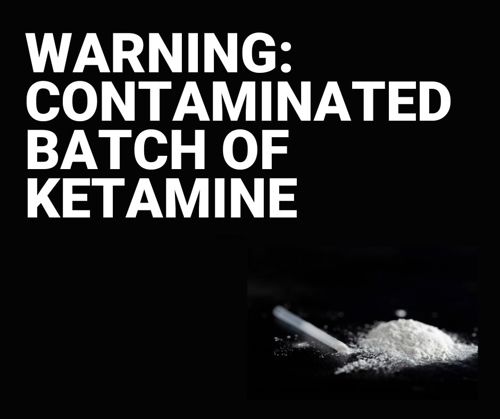
The recent surge coincides with a spell of hot weather and the end of exam season for many young people, with gatherings and celebrations thought to have led to the increase. In particular, this has been noted at The Quarry, Doctor’s Field, The Mount and other riverside locations in Shrewsbury, prompting additional concerns about river safety.
Local drug and alcohol support organisation, We Are With You, have raised concerns about a contaminated batch of ketamine that is in circulation at the moment, which may have been mixed with other toxin(s). This batch could cause someone to become rapidly very unwell, potentially unresponsive and requiring immediate medical assistance.
Ketamine is a powerful anaesthetic and has become increasingly popular as a recreational drug. It looks like a grainy, white powder and reduces sensations in the body, putting users at risk of injury.
At high doses, ketamine can cause people to hallucinate and become very confused, make it difficult to use arms and legs and cause problems to the heart.
Regular or long-term use can cause flashbacks and memory loss, as well as making existing mental health problems worse. It can also lead to damage to organs such as the bladder and liver.
Ketamine can be fatal in the case of overdose or if it is mixed with other substances including alcohol.
In response to current concerns, parents, carers and professionals are being advised to:
- Make time today to have a positive, two-way conversation with young people to raise awareness of ongoing concerns
- Know where young people are going, who with and encourage safer alternatives such as meeting in smaller groups away from locations of concern
- Make sure that you and your young people are equipped with information about the risks, signs to look out for and where to get help Ketamine | Effects of Ketamine | FRANK (talktofrank.com)
- Listen to any questions or experiences that young people want to share with you. Find answers together
- Make sure young people know actions that they can take to reduce harm. This includes looking out for their friends and having a plan for if help is needed
- Know how to find support. Shropshire Council’s drug and alcohol support partners, We Are With You can offer free advice and guidance, including a live web chat at this link: Shropshire - With You (wearewithyou.org.uk)
In an emergency including a risk to life and unresponsiveness, call 999.
If you need more general help and support:
- Contact your GP
- Call NHS 111
- Contact your mental health crisis team (if you have one)
- Call Samaritans free on 116 123 or email jo@samaritans.org
Shropshire Council and Shrewsbury Town Council are working with a range of partner organisations, health services and the local policing team to respond to this issue.

